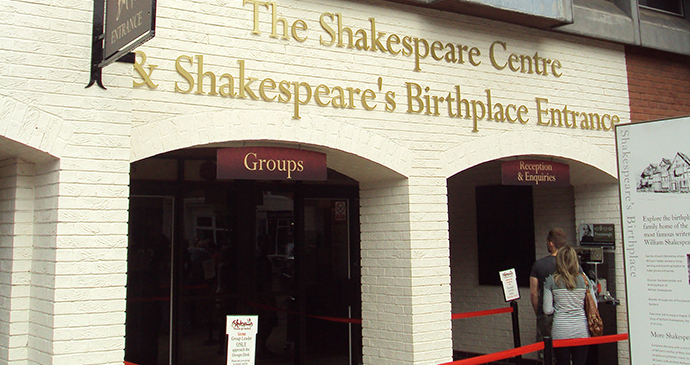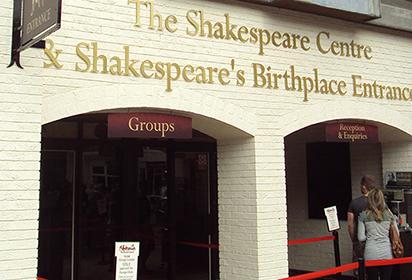Stratford is naturally a place of pilgrimage for anyone with a passion for Shakespeare’s work. But if you just want to find out a little more about the man and his work, the Shakespeare Centre on Henley Street is a good start. The centre holds many events for people of all ages, regardless of academic ability, who simply have an interest in Shakespeare. Activities include literary events and evening talks, often with directors and actors from the RSC and the world’s leading figures on Shakespeare such as Stanley Wells, poetry festivals, study days and short courses about Shakespeare in life, history and performance plus anything else related to Shakespeare, historical Stratford or the Renaissance world. The events are often linked to current productions being performed by the RSC.

The Shakespeare Centre’s entrance © Rept0n1x
Archives can sound like stuffy places full of decaying books gathering dust. Not so the Shakespeare Centre Library (Henley St; 01789 201816), where the staff’s enthusiasm for Shakespeare rubs off on anyone who wanders through the door. I met up with Sylvia Morris, Head of the Shakespeare Centre Library and Archive. She explained how the archives are open to all: ‘The Shakespeare Centre needs to be accessible to anyone who wants to use it, not just students and academics. We hold the world’s most important collection of material relating to Shakespeare, including early printed books, records and documents relating to Shakespeare’s life and to Stratford in his lifetime as well as performance collections. We look after the entire archive of the Royal Shakespeare Company too, plus we’ve also got Shakespeare-related ephemera from all periods such as playbills and programmes, newspaper articles, manuscripts, original artwork, engravings, photographs and videos.’
Sylvia continued, ‘It’s important to us that visitors are not intimidated to come in through the doors. We really want people to be able to engage with us and the material that we have here. All we ask is that visitors arrive with some kind of preconceived interest. Rather than arriving and saying, “I want to find out about Shakespeare,” it may be that they want to find out about a particular play, a certain actor’s involvement with the RSC or a particular aspect in relation to Shakespeare.’
It is the RSC archives that are likely to be of interest to the casual visitor. These include prompt books and production notes including set and costume designs for all their plays and the shooting script for renowned stage performances that have been turned into films. Visitors can also book an audio-visual room to watch past performances from over the years.
‘It is an absolute privilege to work here,’ explained Sylvia. ‘We receive lots of material from abroad. For example, a couple arrived from China and handed over the entire works of Shakespeare translated into Chinese by their uncle. He had been unable to leave China and yet it had been his life’s ambition to visit the collection here. They came as his representatives. I find my work here really quite humbling.’
At this point, Sylvia showed me into the strongrooms where the archive material is kept. Anything from the strongrooms may be brought up to the reading area for visitors to see (they’re generally not allowed ‘below stairs’). She pulled out the Ashburnham copy, a special edition of the First Folio of Shakespeare’s plays published in 1623. The original is fragile, but with excitement dancing in her eyes, Sylvia showed me the pages. This edition includes a heartwarming tribute and introduction to the plays by those contemporaries who produced the book. ‘Shakespeare never published his work during his lifetime,’ Sylvia told me. ‘Without this book and the forethought of his friends and theatre colleagues who got it published, there would be no Shakespeare. His contemporaries knew that he was special and this book is a memorial to someone who was loved.’
Clearly, as if evidence were required, Shakespeare is still loved.
Want to delve deeper into Stratford and the Cotswolds? Here’s 10% off the guide:

